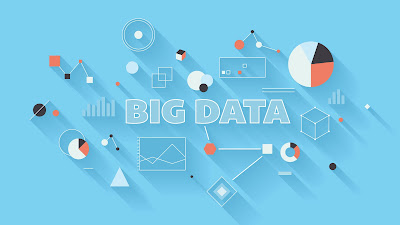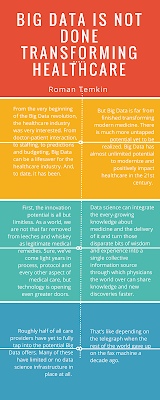Read Roman Temkin's latest insights into world of business, real estate, and money. Roman is a real estate developer based in New York. He lives on the Upper East Side with his two dogs, a German shepherd and a shiba inu.
Monday, November 23, 2015
Big Data is Not Done Transforming Healthcare
From the very beginning of the Big Data revolution, the healthcare industry was very interested. From doctor-patient interaction, to staffing, to predictions and budgeting, Big Data can be a lifesaver for the healthcare industry. And, to date, it has been.
But Big Data is far from finished transforming modern medicine. There is much more untapped potential yet to be realized. Big Data has almost unlimited potential to modernize and positively impact healthcare in the 21st century.
First, the innovation potential is all but limitless. As a world, we are not that far removed from leeches and whiskey as legitimate medical remedies. Sure, we’ve come light years in process, protocol and every other aspect of medical care, but technology is opening even greater doors. Nothing brings all that information, practice and procedure together in more beneficial ways than big data.
Data science can integrate the every-growing knowledge about medicine and the delivery of it and turn those disparate bits of wisdom and experience into a single collective information source through which physicians the world over can share knowledge and new discoveries faster and easier than ever before.
And Big Data’s predictive properties allow doctors and medical facilities to better predict the markers for certain maladies such as cancer or hypertension … and researchers are even working on the ability to predict autism. That sort of gene-level research necessitates algorithms and connective computing that only Big Data can deliver.
The earlier they know to look for things the more successful physicians can be in treatment. That will lead to better patient outcomes, earlier diagnosis and more options for patients facing medical bad news.
Big Data can also help hospitals be healthier. One of the big knocks on going to the Doctor has been the propensity for illness or injury that can occur. But Big Data is helping hospitals become safer places by helping staff catch and/or prevent facility-borne infections sooner. Plus, data science is allowing for better and faster lab results and comparisons, helping hospitals prevent infections and negative reactions to surgeries or other treatments.
Taken together, it’s clear that Big Data is working in every aspect of health care to ensure better outcomes for both patients and care providers. If you run the numbers, data science has the potential to save the healthcare industry hundreds of billions of dollars. Savings they could pass on to their patients and profits that could go to shareholders. But this is only the beginning.
Roughly half of all care providers have yet to fully tap into the potential Big Data offers. Many of these have limited or no data science infrastructure in place at all. That’s like depending on the telegraph when the rest of the world gave up on the fax machine a decade ago. Eventually, Big Data will become as synonymous in health care as the stethoscope. That day is coming, sooner, rather than later. But even then, there will be more to offer.
Roman Temkin is a real estate developer from NYC.
Labels:
big data,
business,
roman temkin,
technology
Subscribe to:
Post Comments (Atom)


No comments:
Post a Comment